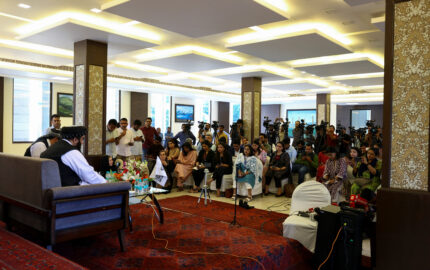Journalism is not going to disappear. As author Michael Schudson observed, if there were not journalists, we’d have to invent them. The real issue is what journalism will look like and if it—and the larger media environment of which it is a part—will ably serve our democracy.
Journalism’s core mission is to provide citizens with useful information about public affairs. While this is not an easy task under the best of circumstances, right now this mission is being challenged by some well-documented economic and technological changes in the media. As a result, traditional news organizations seem to face a Hobson’s choice: Either stay true to the tenets of journalism and risk becoming irrelevant or compete by being more entertaining and/or opinionated.
But there is a viable middle option. It begins with reasoned reflection and a willingness to act on what we know and believe. For example, many of the conditions that created the practice of modern journalism, such as the scarcity of outlets, no longer exist. This is a potentially positive development, though the increasingly centralized ownership of news organizations must be addressed. Having a handful of news outlets operate under the noble but impossible norm of objectivity was never the optimal way to inform citizens. By reducing reporting to the accurate quoting of “both sides” of an issue, journalists often end up stripping what they convey of valuable context and making it dry, boring and confusing. Yet we know that an information environment that abandons commitment to accuracy or fairness is not helpful in guiding citizens to greater understanding—or increasing their ability to make informed decisions—about the critical issues of our time.
What might a new journalism look like? As a starting point, let me suggest the following:
Journalism gets its house in order. Too often journalists fail to live up to their professed standards, as seen in recent mea culpas from CBS News, The New York Times, and The Washington Post. There is confusion, too, between the practice of only reporting what is said and the fundamental goal of uncovering the truth. Add to this the cynical and strategic ways in which elections and politics are covered. Market-driven tensions also seem to influence journalists in setting aside reporting on what people ought to know and substituting what they (often wrongly) think people are interested in knowing about. For journalism to claim its role in democracy, it must walk the talk.
Journalism remains true to its core mission, while acknowledging that it can be accomplished in many ways. Straight reporting of facts is essential, but coverage can also include insightful commentary, debate, humor and opinion. The test should be journalists’ effective communication of some sense of the truth about important topics. The difficulty is not too much “talk,” or ideologically based arguments, or attempts to entertain audiences. Rather it is in the extent to which these presentations do or do not provide useful and useable information.
Journalism expands its watchdog function to include monitoring alternate sources of public information. Citizens need help in sorting through the complexities of civic life, but also in navigating the new media environment. Regular assessments are needed, not only of one’s own news organization’s performance, but also of others, including cable talk shows, Web sites, blogs, even books and politically relevant entertainment genres. Journalism needs to accept that people draw on multiple sources of information, but it also must hold these sources (collectively as well as individually) to standards by which it judges itself. It is not enough for Jon Stewart to claim he isn’t a journalist (but then act like one) or for the Fox News Channel to declare itself “fair and balanced.” Those who provide information must be held accountable to the standards of journalism, and journalists are well positioned to serve this broader ombudsman role.
We are witnessing the blurring of lines between news and entertainment, fact and opinion, even fact and fiction. Today, neither journalists nor the public seem capable of giving clear answers to questions such as, “What is a journalist?” or “What are the rules of journalism?” The solution: Don’t circle the wagons around increasingly outmoded definitions and rules, but take what is best about journalism’s recent past and adapt it to what appears most promising about the new information environment in which we live. It’s only a bit of an exaggeration to suggest that tomorrow’s journalist will need to be a blend of Ted Koppel, Chris Matthews, and Jon Stewart.
Michael X. Delli Carpini is dean of the Annenberg School for Communication at the University of Pennsylvania and coauthor of “What Americans Know About Politics and Why It Matters.” He is working on a book about the blurring of news and entertainment in the media.



